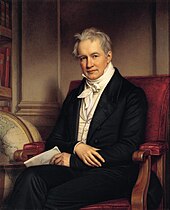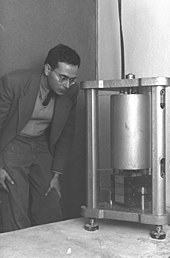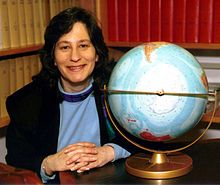Famous geophysicists
Zhang Heng, inventor of the first seismoscope This is a list of geophysicists , people who made notable contributions to geophysics , whether or not geophysics was their primary field. These include historical figures who laid the foundations for the field of geophysics.[ 1] [ 2] [ 3] [ 4] Vetlesen Prize (intended to be the equivalent of a Nobel Prize for geology or geophysics); the William Bowie Medal (the top award of the American Geophysical Union ); the Maurice Ewing Medal (the top award of the Society of Exploration Geophysicists ); and the Crafoord Prize for geosciences. Some geophysicists have also won more general prizes such as the Nobel Prize and the Kyoto Prize .
A
Leason Adams (American, 1887–1969) – high pressure mineral physicsThomas J Ahrens (American, 1936–2010) – experimental methods for modeling hypervelocity impacts and materials in the Earth's core and mantle Hannes Alfvén (Swedish, 1908–1995) – Alfvén waves , magnetohydrodynamics of magnetosphere ; Nobel Prize in Physics Giuseppina Aliverti (Italian, 1894–1982) – geophysicist remembered for developing the Aliverti-Lovera method of measuring the radioactivity of waterKeiiti Aki (Japanese-American, 1930–2005) – seismology; William Bowie Medal Claude Allègre (French, 1937– ) Crafoord Prize Don L. Anderson (American, 1933–2014) – seismology and Earth's interior (including the Preliminary reference Earth model ); Crafoord Prize Nigel Anstey (British, 1927– ) – exploration geophysicist ; Maurice Ewing Medal (SEG)Tanya Atwater (American, 1942– ) – plate tectonic history of North America
B
Francis Birch George Edward Backus (American, 1930– ) – geophysical mathematician, development of geophysical inverse methods ; contributions to dynamo theory Milo Backus (American, 1932–2018) – exploration geophysicist ; practical 3D exploration; Maurice_Ewing_Medal (SEG)[ 5]
Peter Barlow (English, 1776–1862) – experimental and observational studies of terrestrial magnetism , Copley Medal Anthony R. Barringer (Canadian/American, 1925–2009) – developed the INPUT airborne electromagnetic system for detecting ores ; Maurice Ewing Medal (SEG)Julius Bartels (German, 1899–1964) – contributed to physics of the Sun and Moon ; geomagnetism , meteorology and the physics of the ionosphere Louis Bauer (American, 1865–1932) – mapped the Earth's magnetic field Hugo Benioff (American, 1899–1968) – discovered link between deep earthquakes and subduction zones Lloyd Berkner (American, 1905–1967) – studied the ionosphereHenry Bryant Bigelow (American, 1879–1967) – awarded the William Bowie Medal Francis Birch (American, 1903–1992) – developed theoretical and experimental models for the Earth's interior ; Vetlesen Prize Kristian Birkeland (Norwegian, 1867–1917) – first realized that energetic electrons cause the aurora ; nominated 7 times for Nobel Prize Abu Rayhan Biruni (Persian, 973–1048) – made accurate measure of circumference of Earth and other contributions to geodesy Jacob Bjerknes (Norwegian-American, 1897–1975) – awarded the William Bowie MedalPatrick Blackett (English, 1897–1974) – paleomagnetism , continental drift , Nobel Prize Martin Bott (British, 1926–2018) – magnetic anomalies , gravity anomalies Pierre Bouguer (French, 1698–1758) – geodesy ; the Bouguer gravity anomaly William Bowie (American, 1872–1940) – geodesy and isostasy Wallace Smith Broecker (American, 1931–2019) – climate , ocean circulation ; Crafoord Prize, Vetlesen PrizeBernard Brunhes (French, 1867–1910) – paleomagnetism ; discovered the first geomagnetic reversal Walter Hermann Bucher (German-American, 1888–1965) – awarded the William Bowie MedalEdward Bullard (British, 1907–1980) – developed theory of geodynamo , pioneered use of seismology to study the sea floor, and used seafloor bathymetry to test continental drift Keith Edward Bullen (New Zealand-born, 1906–1976) – seismological interpretation of the deep structure of the Earth's mantle and core Victor Robertovich Bursian (Russian, 1886–1945) – pioneer in theory of Electrical resistivity tomography
C
Henry Cavendish Henry Cavendish (British, 1731–1810) – made first estimate of the mass of the Earth Anny Cazenave (French, 1944– ) – geodesy and satellite altimetry; awarded William Bowie MedalVlastislav Cervený (Czech) – exploration geophysicist ; seismic ray theory; Maurice Ewing Medal (SEG)[ 6]
Sydney Chapman (British, 1888–1970) – predicted magnetosphere ; developed theories for effect of solar wind on geomagnetic storms and aurorae Jule Gregory Charney (American, 1917–1981) – dynamical meteorology; awarded William Bowie MedalJon Claerbout (American, 1937– ) – exploration geophysics seismic data processing and imaging; Maurice Ewing Medal (SEG)Alexis Clairaut (French, 1713–1765) – proved Clairaut's theorem and calculated the ellipticity of the Earth William Compston (Australian, 1931– ) – developed the Sensitive High Resolution Ion Micro Probe for isotopic analyses of geological samplesVincent Courtillot (French, 1948– ) – paleomagnetist ; promoted theory that mass extinctions are caused by massive volcanic episodes Thomas Cowling (English, 1906–1990) – solar magnetic field, dynamo theoryAllan V. Cox (American, 1926–1987) – created a timeline for geomagnetic reversals and was a pioneer in plate tectonics ; Vetlesen PrizeAlbert P. Crary (American, 1911–1987) – Arctic and Antarctic exploration, seismology
D
Adam Dziewoński Reginald Aldworth Daly (Canadian, 1871–1957) – awarded the William Bowie MedalGeorge Howard Darwin (British, 1845–1912) – analyzed tides and tidal friction; first to develop mathematical theory for evolution of the Sun–Earth–Moon systemArthur Louis Day (American, 1869–1960) – mineral physics and volcanologyEverette Lee DeGolyer (American, 1886–1956) – exploration geophysics in the petroleum industryRobert S. Dietz (American, 1914–1995) – proposed (and named) – theory of seafloor spreading ; discovered several impact craters including Sudbury Basin Hewitt Dix (American, 1905–1987) – exploration geophysics ; creator of the Dix equation for reflection velocity, recipient of the Maurice Ewing Medal [ 7]
Richard Doell (American, 1923–2008) – created a timeline for geomagnetic reversals and was a pioneer in plate tectonics; Vetlesen PrizeJames Dooge (Irish, 1922–2010) – hydrologyErich von Drygalski (German, 1865–1949) – polar explorer and geophysicistAdam Dziewonski (Polish/American, 1936–2016) – large-scale structure of Earth's interior and nature of earthquakes ; Crafoord Prize
E
F
Benjamin Franklin Gerhard Fanselau (German, 1904–1982) – geomagnetic observationsJoseph Charles Farman (British, 1930–2013) – co-discoverer of the ozone hole Yevgeny Konstantinovich Fyodorov (Russian, 1910–1981) – pioneer in Arctic geophysical surveyOsmond Fisher (British, 1817–1914) – continental drift John Adam Fleming (American, 1877–1956) – magnetosphere and atmospheric electricityJames David Forbes (British, 1809–1868) – built the first seismometer Scott Forbush (American, 1904–1984) – solar-terrestrial interactions and the Forbush decrease Efi Foufoula-Georgiou (Greek, 1957–) – wavelet analysisGillian Foulger (English, 1952– ) – plate theory Robert Were Fox the Younger (British, 1789–1877) – discovered the geothermal gradient ; constructed a dip circle for use at seaBenjamin Franklin (American, 1706–1790) – established that lightning is electrical
G
H
Alexander von Humboldt in 1843 Edmond Halley (English, 1656–1742) – first chart of Earth's magnetic field Christopher Hansteen (Norwegian, 1784–1873) – produced the first charts of the intensity of the Earth's magnetic field Harry Hammond Hess (American, 1906–1969) – seafloor gravity anomalies and theory of seafloor spreading Georg Hartmann (German, 1489–1564) – kept early records of magnetic declination Bernhard Haurwitz (American, 1905–1986) – meteorologyVeikko Aleksanteri Heiskanen (Finnish, 1895–1971) – studies of the global geoid Raymond Hide (British, 1929–2016)Arthur Holmes (British, 1890–1965) – performed first uranium–lead dating M. King Hubbert (American, 1903–1989) – correct statement of Darcy's law and mathematical demonstration that rock undergoes plastic deformation ; Vetlesen PrizeAlexander von Humboldt (German, 1769–1859) – global network of geomagnetic observatoriesRosemary Hutton (Scottish, 1925–2004) – geophysicist and pioneer of magnetotellurics
I
J
K
L
Kurt Lambeck (Dutch, 1941– ) – changed understanding of the ways post-glacial rebound affects ocean levels ; awarded Wollaston Medal and Balzan Prize Johann von Lamont (Scottish, 1805–1879) – surveys of the Earth's magnetic field Louis J. Lanzerotti (American, 1938– ) – magnetosphere and ionosphere; awarded William Bowie MedalJoseph Larmor (Northern Irish, 1857–1942) – proton precession , dynamo theoryInge Lehmann (Danish, 1888–1993) – seismologist who discovered the Lehmann discontinuity and argued for a solid inner core Xavier Le Pichon (French, 1937– ) – constructed history of plate motionsRoyden Charles Lilwall (British, 1944-2023) - Geophysicist / seismologist locating the epicenter of earthquakesHumphrey Lloyd (Irish, 1800–1881) – observational geomagnetismCinna Lomnitz (Chilean–Mexican, 1925–2016) – creator of "Lomnitz Law", founder of Mexico's first seismic network and editor of Geofísica Internacional Andrew Long (Australian, 1965– ) – developed widely used instruments for marine exploration for oil and gas; Honorary Lecturer (Pacific South) for the Society of Exploration Geophysicists Augustus Edward Hough Love (English, 1863–1940) – developed theory of Love waves Bruce P. Luyendyk (American, 1943– ) – marine geophysicsLeon Thomsen (American, 1942 ) - Seismic anisotropy Thomsen parameters (Awards: Maurice Ewing Medal , N.A.E. )
M
Marcia McNutt Andrija Mohorovičić Gordon J. F. MacDonald (American, 1929–2002) – investigated rotation of the Earth and true polar wander James B. Macelwane (American, 1883–1956) – seismologist; awarded William Bowie MedalJean-Jacques d'Ortous de Mairan (French, 1678 –1771) – shape of the Earth and aurora Robert Mallet (Irish, 1810–1881) – developed controlled source seismology ; coined terms seismology and epicenter Syukuro Manabe (Japanese, 1931– ) – climate models; awarded William Bowie MedalPierre de Maricourt (Petrus Peregrinus) (French, fl. 1269) – first extant treatise on properties of magnets ; detailed study of the compass Edme Mariotte (French, 1620–1684) – one of the pioneers of modern hydrology ; used floats to measure river flowDrummond Matthews (British, 1931–1997) – used ocean magnetic anomalies to confirm theory of seafloor spreading Motonori Matuyama (Japanese, 1884–1958) – first to show that a geomagnetic reversal had occurred in the pastDan McKenzie (British, 1942– ) – mathematical framework for plate tectonics ; mantle convection ; sedimentary basin formation; Crafoord PrizeHarry Mayne (American, 1913–1990) – exploration geophysicist , invented CRP stacking for noise reduction; Maurice Ewing Medal (SEG)
Marcia McNutt (American, 1952– ) – elastic strength of lithosphere ; identified the South Pacific superswellFelix Andries Vening Meinesz (Dutch, 1887–1966) – developed a precise gravimeter and discovered gravity anomalies above the ocean floorOscar Edward Meinzer (American, 1876–1948) – groundwater hydrology; awarded William Bowie MedalHenry William Menard (American, 1920–1986) – plate tectonics; awarded William Bowie MedalGiuseppe Mercalli (Italian, 1850–1914) – developed Mercalli intensity scale for measuring earthquakes John Milne (British, 1849–1913) – invented the horizontal pendulum seismograph Andrija Mohorovičić (Croatian, 1857–1936) – identified Mohorovičić discontinuity ;W. Jason Morgan (American, 1935–2023) – geodynamics , plate tectonics Jean Morlet (French, 1931–2007) – developed the wavelet transform for exploration geophysics Lawrence Morley (Canadian, 1920–2013)) – used ocean magnetic anomalies to confirm theory of seafloor spreading Ahsan Mubarak (Pakistani, ?) – seismic detection of nuclear tests
Walter Munk (American, 1917–2019) – rotation of the earth; acoustic tomography of the oceans; Crafoord Prize, Vetlesen Prize, Kyoto Prize
N
O
P
Frank Press, Jerusalem 1953 Luigi Palmieri (Italian, 1807–1896) – seismic studies of Mount Vesuvius Eugene Parker (American, 1927–2022) – solar wind and magnetospheres of the Earth and Sun; awarded Kyoto Prize, National Medal of Science, William Bowie MedalAntares Parvulescu (American, 1923–1998) – inventor of the first time-reversal experiment, and matched equivalent-space signal (MESS) processing.[ 10] [ 11]
Blaise Pascal (French, 1623–1662) – demonstrated that atmospheric pressure decreases with altitudeChaim Leib Pekeris (American, 1908–1993) – mathematical methods to study free vibrations of Earth, tides, and origin of Earth's magnetic field ; Vetlesen PrizeWilliam Richard Peltier (Canadian, 1943– ) – geophysical fluid dynamics , glacial rebound , climate change , Vetlesen PrizePetrus Peregrinus de Maricourt (French, 13th century) – wrote the first extant treatise describing the properties of magnets and the earliest detailed discussion of freely pivoting compass needlesPierre Perrault (1608–1680) – developed the concept of the hydrological cycle Alexis Perrey (French, 1807–1882) – seismologistWalter C. Pitman, III (American, 1931–2019) – seafloor spreading and tectonicsGeorge W. Platzman (American, 1920–2008) – geophysical fluid dynamics , numerical weather prediction [ 12] John Henry Pratt (British, 1809–1871) – laid foundation for principle of isostasy Frank Press (American, 1924–2020) – design of a long-period seismograph, and the first detection of the Earth's normal modes of oscillation; Maurice Ewing Medal (SEG)Albert Thomas Price (British, 1903–1978) – geomagnetism and global electromagnetic induction
R
S
Susan Solomon Edward Sabine (Irish, 1788–1883) – measured oblateness of the Earth; established system of magnetic observatoriesBenjamin D. Santer (American, 1955– ) – climatologistConrad Schlumberger (French, 1878–1936) – and Marcel Schlumberger (French, 1884–1953) – invented electric well logging Michael Schoenberg (American, 1939–2008) – contributions to seismic anisotropyAlessandro Serpieri (Italian, 1823–1885) – seismologistNicholas Shackleton (British, 1937–2006) – paleoceanography , climate , Crafoord Prize , Vetlesen PrizeIrwin I. Shapiro (American, 1929– ) – awarded William Bowie Medal Otto Schmidt (Russian, 1891–1956)Shen Kuo (Chinese, 1031–1095) – discovered magnetic declination Robert E. Sheriff (American, 1922–2014) – exploration geophysics ; Maurice Ewing Medal (SEG)John Sherwood (British) – exploration geophysics ; Maurice Ewing Medal (SEG)[ 14]
Eugene Merle Shoemaker (American, 1928–1997) – planetary science; awarded William Bowie Medal Paul G. Silver (American, 1948–2009) – seismic anisotropy and splitting of shear waves Fred Singer (Austrian-American, 1924–2020) – atmospheric physicist, global warming denier Susan Solomon (American, 1956– ) – proposed chlorofluorocarbons as the cause of the Antarctic ozone hole ; awarded Nobel peace prize and William Bowie Medal David J. Stevenson (New Zealander/American, 1948– ) – theories of internal structure and evolution of planetsBalfour Stewart (Scottish, 1828–1887) – observations of solar flares and geomagnetic storms Henry Stommel (American, 1920–1992) – ocean circulation; awarded William Bowie Medal David Strangway (Canadian, 1934–2016) – lunar geophysics; university administration ; Maurice Ewing Medal (SEG)Carl Størmer (Norwegian, 1874–1957) – motion of charged particles in the magnetosphere and origin of the aurora Harald Sverdrup (Norwegian, 1888–1957) – ocean circulation; awarded William Bowie Medal
T
Albert Tarantola (Spanish, 1949–2009) – geophysical inverse problems; Maurice Ewing Medal (SEG)Pierre Tardi (French, 1897–1972) – geodesist and geophysicistMarie Tharp (1920–2006) – American geologist and oceanographic cartographer who, in partnership with Bruce Heezen, created the first scientific map of the Atlantic Ocean floor.Andrey Nikolayevich Tikhonov (Russian, 1906–1993) – magnetotellurics method in geophysicsNafi Toksöz (Turkish-American, 1937– ) – exploration geophysics ; Maurice Ewing Medal (SEG)[ 15]
Sven Treitel (American, 1929–2024) – exploration geophysicist ; co-inventor of digital seismic signal processing; Maurice Ewing Medal (SEG)[ 16]
Merle Tuve (American, 1901–1982) – used radio waves to measure the ionosphere; United States Medal for Merit Donald L. Turcotte (American, 1932– ) – developed theory of convection in the Earth's mantle , applications of fractals and chaos to Earth processes; William Bowie Medal of the AGU [ 17] [ 18]
V
James van Allen James Van Allen (American, 1914–2006) – Van Allen radiation belts ; awarded Crafoord Prize, Gold Medal of the Royal Astronomical Society (for geophysics), National Medal of Science, William Bowie MedalPetr Vaníček (Czech Canadian, 1935– ) – breakthroughs in theory of spectral analysis and geoid computation, awarded J. Tuzo Wilson Medal , founded Canadian Geophysical Union T. Wayland Vaughan (American, 1870–1952) – study of corals and coral reefs, larger foraminifera, and oceanographyFred Vine (British, 1939– ) – work on marine magnetic anomalies confirmed the theory of seafloor spreading
W
Kiyoo Wadati (Japanese, 1902–1995) – researched subduction zone earthquakes; lent name to Wadati–Benioff zone Alfred Wegener (German, 1880–1930) – developed theory of continental drift Frank T. M. White (Australian, 1909–1971) – mining and metallurgical engineer; mineral science educatorEmil Johann Wiechert (German, 1861–1928) – first verifiable model of layered structure of the Earth ; pioneering work on propagation of seismic waves J. Tuzo Wilson (Canadian, 1908–1993) – contributions to plate tectonics : theories of hotspots , transform faults and Wilson cycles ; Vetlesen Prize; Maurice Ewing Medal (SEG); President of AGU ;J. Lamar Worzel (American, 1919–2008) – contributions to underwater acoustics, underwater photography, and gravity measurements at seaCarl Wunsch (American, 1941– ) – ocean circulation, climatology; awarded the William Bowie Medal
Z
See also
References
^ Gillmor, C. Stewart, ed. (1986). History of geophysics . Vol. 1. Washington: American Geophysical Union. ISSN 8755-1217 . ^ Gillmor, C. Stewart, ed. (1986). History of geophysics . Vol. 2. Washington: American Geophysical Union. ISBN 978-0-87590-276-0 ^ Landa, Edward R.; Ince, Simon, eds. (1987). History of geophysics . Vol. 3: The History of Hydrology. Washington, DC: American Geophysical Union. ISBN 978-0-87590-277-7 ^ Gillmor, C. Stewart, ed. (1990). History of geophysics . Vol. 4. Washington, D.C.: American Geophysical Union. ISBN 978-0-87590-278-4 ^ "Milo Backus" . SEG wiki . Society of Exploration Geophysicists. Retrieved 5 October 2020 .^ "Vlastislav Cervený" . SEG wiki . Society of Exploration Geophysicists. Retrieved 5 October 2020 .^ "C. Hewitt Dix" . SEG wiki . Society of Exploration Geophysicists. Retrieved 5 October 2020 .^ Ray, Elaine (29 September 2011). "Amos Nur awarded Maurice Ewing Medal for contributions to geophysics" . The Dish . Stanford University. Retrieved 5 October 2020 . ^ "Amos Nur" . SEG wiki . Society of Exploration Geophysicists. Retrieved 5 October 2020 .^ "Navy physicist Antares Parvulescu dies at 74" . The Washington Post . 18 July 1998. Retrieved 6 September 2016 .^ Larmat, Carène; Clay, Clarence S. (2011). "Time Reversal in Seismology". Encyclopedia of Solid Earth Geophysics . Encyclopedia of Earth Sciences Series. pp. 1449–1452. doi :10.1007/978-90-481-8702-7_234 . ISBN 978-90-481-8701-0 ^ Koppes, Steve (18 August 2008). "George W. Platzman, meteorologist, 1920–2008" . UChicagoNews . The University of Chicago. Retrieved 13 April 2014 . ^ "Enders Robinson" . SEG wiki . Society of Exploration Geophysicists. Retrieved 5 October 2020 .^ "John Sherwood" . SEG wiki . Society of Exploration Geophysicists. Retrieved 5 October 2020 .^ "Nafi Toksöz" . SEG wiki . Society of Exploration Geophysicists. Retrieved 5 October 2020 .^ "Sven Treitel" . SEG wiki . Society of Exploration Geophysicists. Retrieved 5 October 2020 .^ "2003 William Bowie Medal Winner: Donald L. Turcotte" . Honors Program . American Geophysical Union. Retrieved 16 April 2014 .^ "Turcotte, Donald Lawson". American Men and Women of Science . Vol. 7: T-Z. Gale. 2003. p. 173. ISBN 0-7876-6530-4
Overview Subfields Physical Related disciplines










